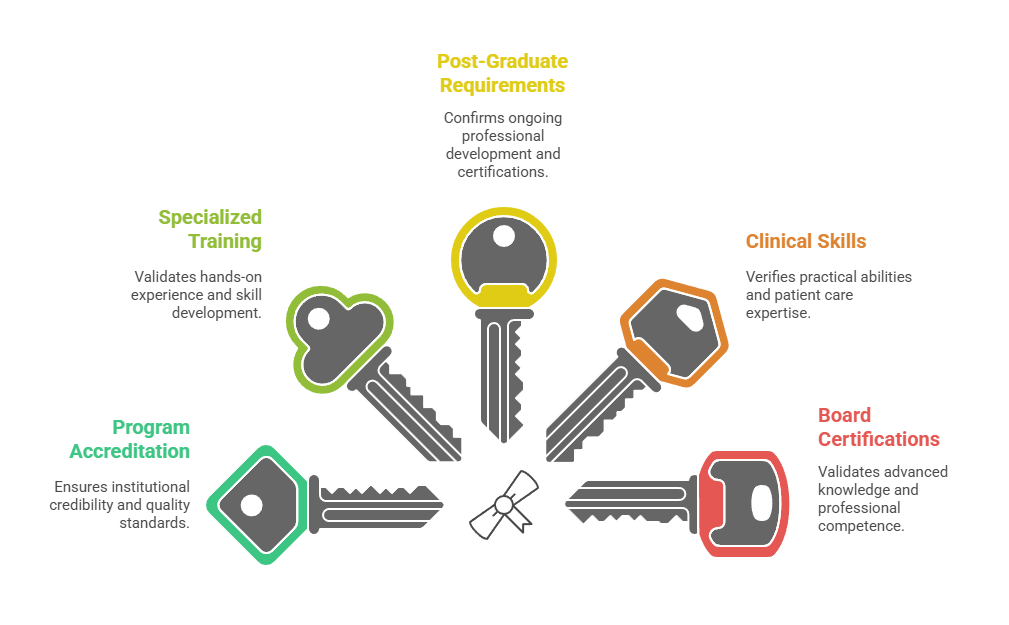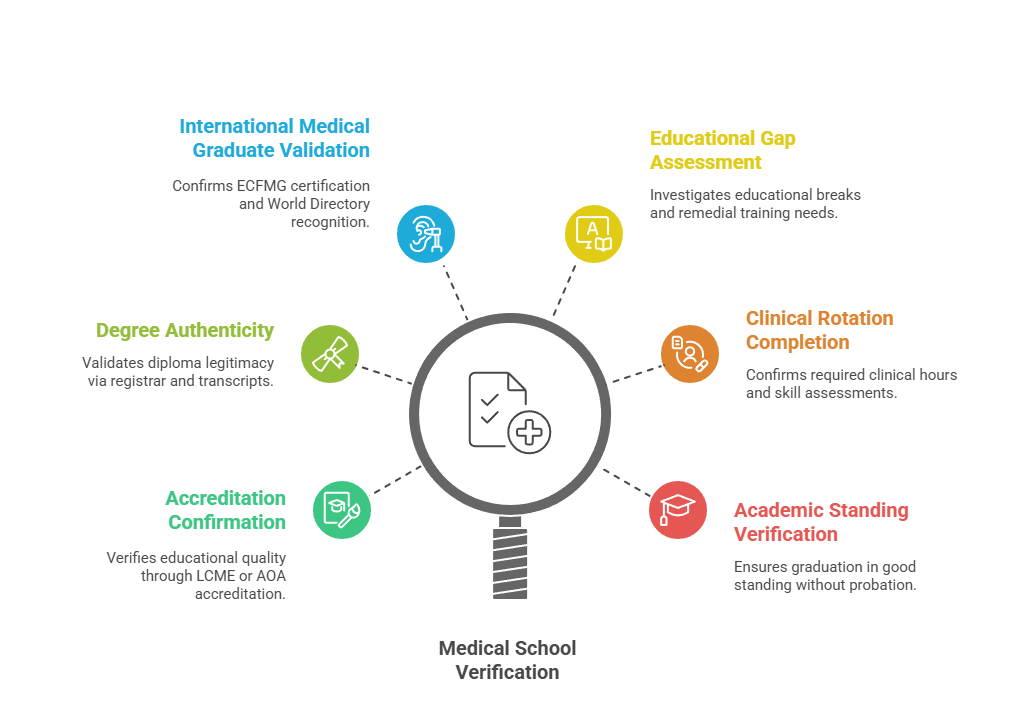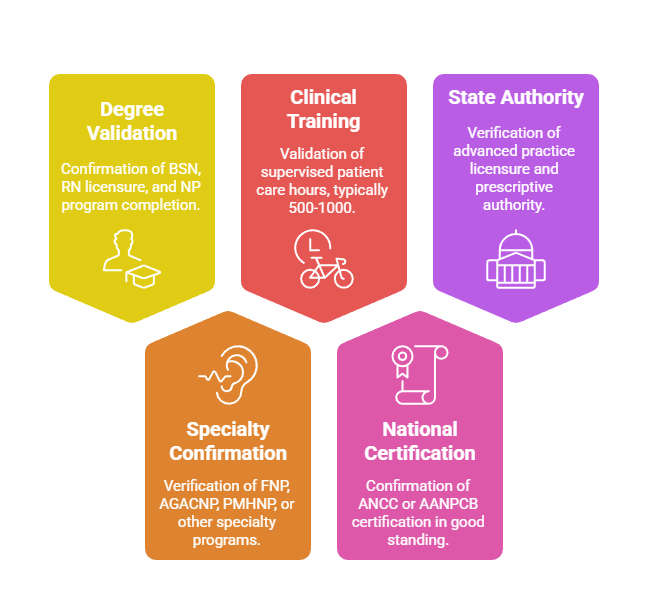Professional school background checks require specialized verification protocols that extend far beyond standard degree confirmations. This is especially true for healthcare, legal, and regulated industries where credential fraud poses severe compliance and patient safety risks. This guide addresses complex verification requirements for medical schools, law schools, pharmacy programs, and other specialized degrees, ensuring employers navigate accreditation standards, clinical training confirmation, and board certification validation with precision.
Key Takeaways
- Professional school background checks must verify degree completion, accreditation status, clinical rotations, residency programs, and specialty certifications to ensure regulatory compliance and protect organizations from liability.
- Healthcare credential verification requires confirmation through primary sources like ECFMG for international medical graduates, state licensing boards, and the National Student Clearinghouse to satisfy Joint Commission standards.
- Law school verification extends beyond JD degrees to include bar admission status, law review participation, judicial clerkships, and specialized program certifications that impact attorney qualifications.
- Pharmacy, dental, and veterinary school verifications demand confirmation of specialized accreditations (ACPE, CODA, AVMA) and hands-on clinical training that generic background check services often miss.
- Residency and fellowship verification represents a critical gap in standard checks, requiring direct confirmation with program directors and ACGME-accredited institutions to validate post-graduate training.
- FCRA compliance for professional school verification mandates specific adverse action procedures, disclosure requirements, and authorization protocols when credential discrepancies emerge.
- Turnaround times for professional school background checks typically extend 5-10 business days due to manual verification requirements, international degree validation, and institutional response delays.
- Credential verification organizations (CVOs) provide deeper validation than consumer reporting agencies, particularly for healthcare roles requiring Joint Commission or NCQA accreditation compliance.
Understanding Professional School Background Check Requirements
What Makes Professional School Verification Different
Professional school background checks differ fundamentally from standard degree verifications. Specifically, the regulated nature of careers requiring advanced specialized education creates this difference. When hiring physicians, attorneys, pharmacists, or other licensed professionals, employers face legal obligations and liability concerns. Consequently, these situations demand extensive verification beyond basic degree confirmation.
A professional school background check validates multiple critical components beyond diploma confirmation. These verifications ensure candidates possess the qualifications they claim and meet industry-specific standards. Moreover, the process protects organizations from credential fraud while meeting regulatory requirements mandated by accrediting bodies.
Key verification elements include:

- Program accreditation status: Confirmation that the institution held proper accreditation during enrollment through recognized accrediting bodies specific to each professional field
- Specialized training components: Validation of clinical rotations, residency programs, fellowship training, and hands-on skill development required for licensure eligibility
- Post-graduate requirements: Verification of additional training, certifications, and continuing education completed after degree conferral
- Clinical skills: Confirmation of practical skill development, patient care hours, and supervised training experiences essential to patient safety
- Board certifications: Validation of specialty exams passed and professional certifications maintained for advanced practice areas
Healthcare systems hiring doctors must confirm medical school accreditation through the Liaison Committee on Medical Education (LCME) or American Osteopathic Association (AOA). Similarly, law firms verifying attorney credentials need confirmation that law schools held American Bar Association (ABA) accreditation during enrollment. Employers who skip these steps risk hiring professionals with unaccredited degrees. As a result, organizations face malpractice liability, regulatory penalties, and credentialing failures.
EXPERT INSIGHT: Behind every professional title lies a story of years of study, training, and perseverance—and as employers, we owe our employees, our businesses, and our wider communities a duty of care to ensure those stories are true. Checking people’s credentials as professionals is not a question of questioning—whether we trust them, whether we respect them—it’s a question of respect itself: respect for the profession, respect for those who earn the right to practice that profession, and respect not least for those people whose lives are in the balance as a result. - Charm Paz, CHRP
Regulatory Frameworks Governing Professional Credential Verification
Multiple regulatory bodies establish verification requirements for professional school background checks. Therefore, these frameworks create compliance obligations employers must navigate carefully. Understanding these requirements helps organizations avoid costly penalties and maintain hiring standards.
The Joint Commission mandates healthcare organizations verify education, training, and competence for medical staff through primary source verification. In particular, direct confirmation from educational institutions is required rather than relying solely on candidate-provided documents. Additionally, the National Committee for Quality Assurance (NCQA) imposes similar requirements for health plans credentialing providers.
The Fair Credit Reporting Act (FCRA) governs professional school background checks when employers engage consumer reporting agencies. Accordingly, FCRA compliance requires specific disclosure and authorization procedures before verification begins. When credential discrepancies emerge, this triggers adverse action procedures. These include pre-adverse action notices, reasonable waiting periods, and final adverse action notifications. Furthermore, state-level requirements add complexity, with some jurisdictions imposing stricter verification standards.
The Cost of Inadequate Professional School Verification
Organizations that fail to implement complete professional school background checks face significant financial and reputational consequences. For instance, healthcare systems hiring physicians with fraudulent credentials risk malpractice lawsuits where credential verification failures become central liability issues. Legal settlements in such cases frequently exceed millions of dollars when patient harm results.
Medical School Verification Services and Healthcare Education Checks

Regulatory penalties compound financial losses when accrediting bodies discover verification failures during audits. For example, the Joint Commission may place hospitals on accreditation watch or withdraw accreditation entirely. Consequently, this jeopardizes Medicare participation and insurance network contracts. Law firms hiring attorneys with unverified credentials face bar association sanctions, malpractice claims, and client lawsuits. Overall, these consequences demonstrate why professional school verification requires specialized expertise.
Validating Medical School Credentials and Accreditation
Medical school verification services provide complete validation addressing healthcare hiring requirements. Standard verification confirms degree completion, graduation dates, and attendance periods. However, professional-grade medical school checks extend further to ensure complete credential validation.
Essential medical school verification components include:

- Accreditation confirmation: Direct verification that institutions held LCME or AOA accreditation during enrollment, ensuring educational quality standards
- Degree authenticity: Validation of diploma legitimacy through registrar offices and official transcript review
- International medical graduate validation: ECFMG certification confirmation and World Directory of Medical Schools recognition
- Educational gap assessment: Investigation of breaks in education, remedial training, or program transfers
- Clinical rotation completion: Confirmation of required hands-on training hours and skill assessments
- Academic standing verification: Confirmation of graduation in good standing without academic probation
Healthcare employers hiring physicians trained internationally face additional verification complexity. Specifically, ECFMG certification serves as the primary validation mechanism for IMGs, confirming credentials meet standards for U.S. residency eligibility. Many healthcare systems require complete primary source verification contacting medical schools directly. This is particularly important when ECFMG certification predates recent credentialing standards updated in 2024.
Residency Verification for Employers and Specialty Training Confirmation
Residency verification represents a critical component that standard services frequently overlook. Board certification confirms specialty training completion. In contrast, direct residency program verification validates hands-on clinical training essential to physician skills. Employers should confirm residency program accreditation through the Accreditation Council for Graduate Medical Education (ACGME). Additionally, they must verify completion dates and validate that training matches position requirements.
Fellowship training verification adds another layer for subspecialty positions. Healthcare organizations hiring cardiologists, gastroenterologists, or other subspecialists must verify both residency and fellowship completion. Typically, this occurs through program directors or institutional graduate medical education offices. This ensures candidates completed the full training pathway required for specialty board certification and hospital privileging.
Residency verification challenges include program closures, program director changes, international training, and multiple training sites. These complexities underscore why healthcare employers benefit from engaging specialized medical credential verification services. Notably, these services maintain established relationships with training programs.
Law School Credential Verification and Legal Professional Checks

Law school credential verification requires specialized protocols addressing the regulated nature of legal practice. Standard degree verification confirms Juris Doctor (JD) completion and graduation dates. However, complete legal professional background checks must validate much more to ensure hiring compliance.
Verifying Law School Degrees and Bar Admission Status
Critical law school verification elements include ABA accreditation status during enrollment, academic standing confirmation, and bar admission status. Specifically, verification covers all jurisdictions where the candidate claims licensure. Law firms and corporate legal departments face significant risk when hiring attorneys whose credentials fail verification.
| Verification Component | Why It Matters | Primary Verification Source |
| ABA Accreditation | Ensures law school met standards during enrollment, required for bar eligibility | American Bar Association database |
| Bar Admission Status | Confirms active licensure and good standing in practice jurisdictions | State bar association records |
| Disciplinary History | Reveals ethical violations, suspensions, or disbarment actions | State bar disciplinary databases |
| Academic Standing | Validates graduation status and honors designations | Law school registrar offices |
| Jurisdictional Licenses | Confirms multi-state practice authorization | Individual state bar associations |
Bar admission verification confirms professional qualifications beyond educational achievement. It verifies active licensure, good standing status, and disciplinary history. In comparison, law school verification validates educational foundation, while bar status confirms the attorney completed character and fitness evaluations and passed jurisdictional bar exams.
Advanced Legal Credential Verification Components
Complete law school background checks address additional credentials that distinguish attorney expertise. Law review participation, moot court experience, judicial clerkships, and specialized program certificates merit verification. This is especially true when candidates highlight these as qualifications.
International legal education creates significantly increased verification complexity. In particular, validation of foreign law degrees, jurisdictional admission requirements, and any additional U.S. legal education must occur. Many U.S. jurisdictions require foreign-trained attorneys to complete LLM programs at ABA-accredited institutions before bar exam eligibility. Therefore, employers hiring attorneys with international backgrounds should engage specialized legal credential verification services.
Additional verification considerations include specialized certifications, publication verification, teaching experience, pro bono work, and clerkship verification. These become particularly important for senior-level legal positions, partnership decisions, and roles requiring specialized expertise.
Pharmacy, Dental, and Veterinary School Background Screening

Pharmacy School Verification Requirements and NAPLEX Validation
Verifying pharmacy school credentials demands confirmation of specialized accreditation and skill assessments essential to safe pharmaceutical practice. The Accreditation Council for Pharmacy Education (ACPE) sets standards for Doctor of Pharmacy (PharmD) programs. As a result, accreditation verification becomes critical when hiring pharmacists.
Professional school background checks for pharmacy roles must address several key areas. First, ACPE accreditation during enrollment requires confirmation. Furthermore, experiential training completion including required rotation hours needs validation. Finally, the North American Pharmacist Licensure Exam (NAPLEX) passage must be verified. Healthcare systems, retail pharmacies, and pharmaceutical companies hiring pharmacists face regulatory obligations mandated by state pharmacy boards.
Verification should address degree completion and specialized certifications. These include Board Certified Pharmacotherapy Specialist (BCPS) credentials, immunization administration certificates, and controlled substance registration status. Notably, pharmacy credential verification differs from general healthcare background checks due to specialized knowledge requirements and direct patient care responsibilities.
Dental and Veterinary School Credential Checks
Dental school credential verification must confirm Commission on Dental Accreditation (CODA) accreditation for Doctor of Dental Surgery (DDS) or Doctor of Dental Medicine (DMD) programs. Complete dental professional background checks extend beyond degree confirmation. Specifically, they validate clinical training completion, state dental board licensure, and specialty certifications.
Dental verification complexity increases with specialty certifications. Orthodontists, periodontists, oral surgeons, and other specialists require verification of specialty residency program completion. Additionally, board certification through the American Board of Dental Specialties or individual specialty boards must be confirmed.
Veterinary school background screening requires validation of American Veterinary Medical Association (AVMA) Council on Education accreditation. Verification complexity increases for veterinarians with international education. Many practicing in the United States graduated from foreign veterinary schools. Consequently, they require Educational Commission for Foreign Veterinary Graduates (ECFVG) certification or Program for the Assessment of Veterinary Education Equivalence (PAVE) completion.
Veterinary specialty verification includes specialty board certification through the American Board of Veterinary Specialties (ABVS). Moreover, it covers residency program completion, internship verification, and continuing education compliance.
Nurse Practitioner Program Verification and Advanced Practice Nursing Checks

Verifying Nurse Practitioner Education and Clinical Training
Nurse practitioner program verification addresses the multi-layered educational pathway required for advanced practice nursing roles. Healthcare employers must verify graduate-level nurse practitioner program completion. In addition, they must confirm the underlying Bachelor of Science in Nursing (BSN) degree and original registered nurse (RN) licensure through state nursing boards.
Commission on Collegiate Nursing Education (CCNE) or Accreditation Commission for Education in Nursing (ACEN) accreditation verification ensures programs met educational standards. Clinical training hour confirmation validates hands-on skill development essential to safe patient care.
Essential nurse practitioner verification components include:

- Multi-level degree validation: Confirmation of BSN completion, RN licensure, and graduate NP program completion
- Specialty program confirmation: Verification of Family Nurse Practitioner (FNP), Adult-Gerontology Acute Care (AGACNP), Psychiatric-Mental Health (PMHNP), or other specialty programs
- Clinical training hours: Validation of supervised patient care hours, typically 500-1000 hours depending on specialty
- National certification status: Confirmation of ANCC or AANPCB certification in good standing
- State practice authority: Verification of advanced practice licensure and prescriptive authority
National certification verification through ANCC or AANPCB provides additional validation. However, this should not replace direct educational verification with nursing schools.
Specialized Nursing Credential Verification Requirements
Healthcare organizations hiring Certified Registered Nurse Anesthetists (CRNAs), Clinical Nurse Specialists (CNSs), or Certified Nurse Midwives (CNMs) face additional requirements. CRNA background checks must confirm nurse anesthesia program accreditation through the Council on Accreditation of Nurse Anesthesia Educational Programs (COA). Additionally, clinical case completion and National Board of Certification and Recertification for Nurse Anesthetists (NBCRNA) certification status require verification.
Specialized advanced practice nursing education creates verification challenges. This occurs when candidates completed education through online programs, dual-degree pathways, or post-master's certificate programs. Employers must verify the appropriate credential level, ensuring candidates hold the specific degree required for the role.
Clinical nurse specialist verification requires population focus validation, direct care hours verification, advanced pathophysiology coursework confirmation, and leadership training verification.
Specialized Degree Verification Process and Best Practices
Primary Source Verification Protocols
Primary source verification represents the gold standard for professional school background checks. This approach requires direct confirmation from educational institutions. Verifiers contact schools directly through established verification channels. Subsequently, they submit verification requests with candidate authorization and obtain official confirmation.
| Verification Method | Reliability | Typical Timeframe | Best Use Case |
| Primary Source | Highest | 5-15 business days | Healthcare credentialing, regulated roles requiring Joint Commission compliance |
| National Student Clearinghouse | High | 2-5 business days | General degree verification for participating institutions |
| Third-Party Databases | Moderate | 1-3 business days | Initial screening before primary source confirmation |
| Candidate Documents | Low | Immediate | Preliminary review only, requires secondary verification |
Employers implementing primary source verification should anticipate extended turnaround times. This is particularly true for older degrees, international institutions, or schools with limited verification staff. Most professional schools require written verification requests with candidate signatures authorizing information release. Processing times range from 5-15 business days depending on institutional responsiveness.
Addressing Verification Challenges and Credential Discrepancies
Verification challenges emerge regularly due to institutional closures, international education complexity, name changes, and documentation inconsistencies. When institutions have closed, employers must identify designated record custodians or state education departments maintaining academic records.
Credential discrepancies require careful investigation and FCRA-compliant adverse action procedures. This applies when employers use consumer reporting agencies. Common discrepancies include graduation date variations, degree title differences, honors designation conflicts, and enrollment period inconsistencies. Employers should provide candidates opportunities to address discrepancies before making adverse hiring decisions.
Common verification obstacles include institutional name changes, registrar office understaffing, international time zone differences, language barriers, and incomplete candidate information. Professional credential verification specialists develop expertise navigating these challenges.
Selecting Professional School Verification Services and Providers
Credential verification organizations (CVOs) specialize in professional school background checks for healthcare and regulated industries. When selecting verification providers, employers should evaluate accreditation through organizations like the National Association of Professional Background Screeners (NAPBS). Additionally, they should assess experience with specific professional school types and turnaround time guarantees.
Evaluating Credential Verification Organizations
Healthcare organizations requiring Joint Commission compliance should prioritize CVO providers familiar with accreditation standards. Key differentiators include international degree validation capabilities, access to proprietary verification networks, customer service responsiveness, and technology platforms.
Critical provider selection criteria include:
- Accreditation and compliance expertise: NAPBS membership, FCRA compliance protocols, and Joint Commission familiarity
- Specialty-specific experience: Proven track record verifying medical, legal, pharmacy, nursing, and veterinary credentials
- International verification capabilities: Established relationships with foreign institutions and credential evaluation services
- Technology platform features: Secure portals, automated status updates, document management, and audit trail maintenance
- Turnaround time guarantees: Clear service level agreements with expedited options for urgent verifications
- Customer support quality: Dedicated account representatives and responsive problem resolution
Providers serving healthcare employers should offer integrated license verification, sanctions screening, and DEA registration checks alongside educational verification. Employers hiring across multiple professional categories benefit from complete providers handling verifications through a single platform.
Building Internal Verification Processes
Organizations with high-volume professional hiring may benefit from developing internal verification capabilities. These can be supplemented by third-party services for complex cases. Internal processes provide greater control over verification timelines and reduce per-verification costs.
Successful internal programs require dedicated credentialing staff with specialized training. Furthermore, they need established relationships with frequently-used educational institutions and robust documentation systems ensuring FCRA compliance.
Whether using external services or internal processes, employers must implement quality control measures. Regular audits sampling completed verifications help identify process gaps and training needs. For healthcare organizations, credentialing committee oversight provides additional quality assurance.
Internal verification program considerations include staffing requirements, technology investments, training programs, institutional relationships, and backup vendor selection. Organizations must weigh internal capability development against outsourcing costs and consider hybrid models.
Conclusion
Professional school background checks require specialized expertise and verification protocols far exceeding standard degree confirmation. Healthcare, legal, and regulated professional roles particularly demand thorough verification. Credential fraud poses significant liability and compliance risks affecting organizational reputation and patient safety.
Employers must navigate complex accreditation validation, clinical training verification, specialty certification confirmation, and primary source documentation. Meanwhile, they must maintain FCRA compliance throughout the process. Implementing complete verification protocols addresses unique requirements of medical schools, law schools, pharmacy programs, and other specialized degrees. Organizations protect themselves from credential fraud while ensuring workforce skills meet regulatory standards. The investment in thorough professional school verification prevents costly consequences. These include malpractice liability, regulatory penalties, accreditation failures, and reputational damage.
Frequently Asked Questions
How long does a professional school background check take?
Professional school background checks typically require 5-10 business days through primary source verification. Complex verifications may extend to 15-20 business days. International institutions, closed schools, or multiple degree levels increase complexity. Therefore, employers should plan hiring timelines accordingly and consider expedited services when urgent needs arise.
What is included in medical school verification services?
Medical school verification services include degree completion confirmation, graduation date validation, and accreditation status verification through LCME or AOA. Additionally, complete services verify residency completion, fellowship training, ECFMG certification for international graduates, and board certification status. These ensure candidates possess complete training required for medical practice and satisfy Joint Commission requirements.
Do employers verify law school credentials beyond bar admission?
Yes, many legal employers verify law school credentials independently of bar admission status. Verification confirms ABA accreditation, degree completion dates, and academic standing through law school registrars. Bar admission alone does not validate law school completion, as some jurisdictions allow bar examination through alternative pathways.
Can employers verify professional school credentials internationally?
Employers can verify international professional school credentials through specialized verification services experienced in foreign institution validation. Processes are more complex and time-consuming than domestic verification. For healthcare roles, ECFMG certification provides standardized validation for international medical graduates. Other professions may require direct institution contact or foreign credential evaluation services.
What happens if a professional school background check reveals discrepancies?
When background checks reveal credential discrepancies, FCRA-compliant employers must follow adverse action procedures. These include pre-adverse action notice with results, reasonable waiting period of at least five business days for dispute, and final adverse action notification if offer is rescinded. Candidates should receive opportunities to address discrepancies before final decisions.
Are nurse practitioner programs verified the same way as medical schools?
Nurse practitioner program verification follows similar primary source protocols as medical school verification. However, it addresses graduate nursing program completion, clinical training hour confirmation, and CCNE or ACEN accreditation validation. Furthermore, verification must confirm underlying BSN degree completion and RN licensure, prerequisites for nurse practitioner education.
What is primary source verification for professional credentials?
Primary source verification involves obtaining credential confirmation directly from the issuing institution. Verifiers contact registrar offices directly for official confirmation of degree completion, graduation dates, and attendance periods. This satisfies regulatory requirements for healthcare credentialing and Joint Commission standards.
Do all professional school background checks require FCRA compliance?
FCRA compliance requirements apply when employers use consumer reporting agencies for verification. In contrast, employers conducting verifications directly without third-party screening services face different regulatory obligations under state laws but avoid FCRA adverse action procedures. Most healthcare organizations use consumer reporting agencies and must follow FCRA requirements.
Additional Resources
- National Student Clearinghouse Degree Verification Services
https://www.studentclearinghouse.org/ - Joint Commission Standards for Primary Source Verification
https://www.jointcommission.org/ - FCRA Compliance Guide for Background Checks
https://www.ftc.gov/enforcement/statutes/fair-credit-reporting-act - Educational Commission for Foreign Medical Graduates Certification
https://www.ecfmg.org/ - American Bar Association Law School Accreditation Database
https://www.americanbar.org/groups/legal_education/resources/aba_approved_law_schools/ - National Association of Professional Background Screeners Best Practices
https://www.napbs.com/ - Accreditation Council for Pharmacy Education Directory
https://www.acpe-accredit.org/
Still have questions?
Get in touch with our team today for a personalized demo and discover how our tailored volume pricing and packages can drive results for your business!
How useful was this page?*
Note: your comments are anonymous. We use them to improve the website. Do not include any personal details.
Visit our FCRA Compliance Tool or leave a message here if you need a response.
From the blog Explore the GCheck Content Hub

Level 2 Background Check: 2026 Guide for HR Professionals
7 Jan, 2026 • 22 min read
What Does an SSN Trace Show? 2026 Guide for Employers and Job Seekers
7 Jan, 2026 • 22 min read
How to Dispute a False Positive Drug Test in 2026: Guide for Employers and Employees
6 Jan, 2026 • 22 min readThe information provided in this article is for general informational and educational purposes only and should not be construed as legal advice or a substitute for consultation with qualified legal counsel. While we strive to ensure accuracy, employment screening laws and regulations—including but not limited to the Fair Credit Reporting Act (FCRA), Equal Employment Opportunity Commission (EEOC) guidelines, state and local ban-the-box laws, industry-specific requirements, and other applicable federal, state, and local statutes—are subject to frequent changes, varying interpretations, and jurisdiction-specific applications that may affect their implementation in your organization. Employers and screening decision-makers are solely responsible for ensuring their background check policies, procedures, and practices comply with all applicable laws and regulations relevant to their specific industry, location, and circumstances. We strongly recommend consulting with qualified employment law attorneys and compliance professionals before making hiring, tenant screening, or other decisions based on background check information.


